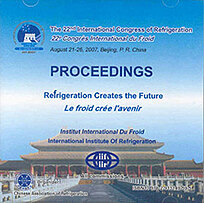
Document IIF
Etude sur les accumulateurs à basse pression dans des cycles frigorifiques au CO2.
Investigation of low pressure accumulators in CO2 refrigeration cycles.
Auteurs : STRUPP C., LEMKE N., TEGETHOFF W., et al.
Résumé
Usually, automotive R-744 HVAC units make use of a low pressure accumulator. A top-performing accumulator is crucial for a reliable operation of the system on the one hand and a good COP on the other. Regarding the design of the accumulator a main objective is to allow a proper separation and at the same time to avoid packaging problems due to unnecessary excess volume. In addition, an appropriate oil bleed hole has to be integrated to allow both oil return and a good performance of the accumulator. In order to improve the accumulator design and to allow computer modeling a profound knowledge of the functioning inside the accumulator is crucial. To meet these goals, a glass accumulator was designed. The paper presents this accumulator and the experimental results. The experiments conducted for two different separation mechanisms show a dependency of accumulator behaviour on liquid level, mass flow rate and oil bleed hole diameter. Based on the measurement data a physical based MODELICA model is presented. Furthermore, experiments conducted to study the influence of the refrigerant cycle oil concentration on the accumulator flow pattern and performance are presented.
Documents disponibles
Format PDF
Pages : ICR07-E1-1480
Disponible
Prix public
20 €
Prix membre*
Gratuit
* meilleur tarif applicable selon le type d'adhésion (voir le détail des avantages des adhésions individuelles et collectives)
Détails
- Titre original : Investigation of low pressure accumulators in CO2 refrigeration cycles.
- Identifiant de la fiche : 2008-0365
- Langues : Anglais
- Source : ICR 2007. Refrigeration Creates the Future. Proceedings of the 22nd IIR International Congress of Refrigeration.
- Date d'édition : 21/08/2007
Liens
Voir d'autres communications du même compte rendu (839)
Voir le compte rendu de la conférence
Indexation
-
Thèmes :
CO2;
Conditionnement d'air mobile - Mots-clés : Automobile; Conception; Réservoir; Récupération; Huile; Experimentation; Conditionnement d'air; CO2
-
Contribution of heat exchangers in improved per...
- Auteurs : GIANNAVOLA M., YIN J., BULLARD C., et al.
- Date : 2003
- Langues : Anglais
- Source : ASHRAE Transactions. 2003 Winter Meeting, Chicago, Illinois. Volume 109, part 1 + CD-ROM.
Voir la fiche
-
Développement d'un compresseur à spirale au CO2...
- Auteurs : HAGITA T., KOBAYASHI H., TAKEUTI M., et al.
- Date : 07/12/2000
- Langues : Japonais
- Source : The International Symposium on HCFC Alternative Refrigerants and Environmental Technology 2000: Latest technology for Energy Conservation, Refrigerants and Recycling on Air-Conditioning and Refrigeration Equipment for the 21st century. Proceedings.
Voir la fiche
-
An improved CO2 cooling system for the up-armor...
- Auteurs : MANZIONE J., COLLIER S., MEMORY S., et al.
- Date : 29/05/2006
- Langues : Anglais
- Source : 7th IIR-Gustav Lorentzen Conference on Natural Working Fluids (GL2006). Proceedings
- Formats : PDF
Voir la fiche
-
Systèmes de conditionnement d'air automobiles a...
- Auteurs : PETITJEAN C.
- Date : 06/02/2002
- Langues : Français
- Source : Alternatives au R22 en génie climatique : avantages et inconvénients. Journée française du Froid : recueil des conférences.
Voir la fiche
-
R744 MAC systems from conventional driven vehic...
- Date : 19/10/2009
- Langues : Anglais
Voir la fiche
